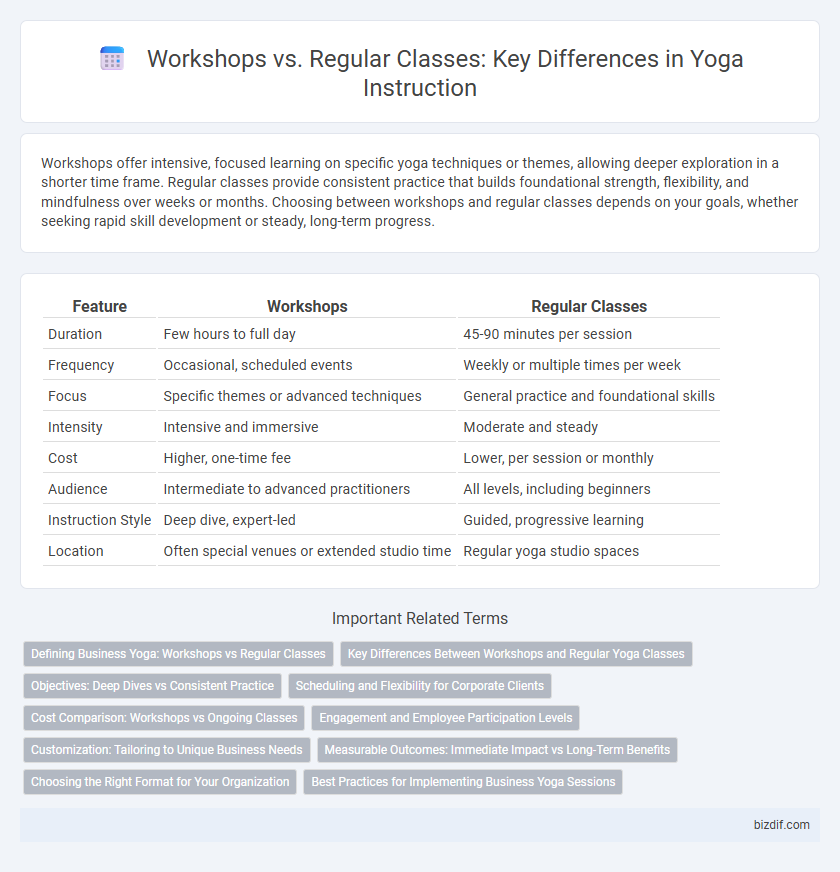Workshops offer intensive, focused learning on specific yoga techniques or themes, allowing deeper exploration in a shorter time frame. Regular classes provide consistent practice that builds foundational strength, flexibility, and mindfulness over weeks or months. Choosing between workshops and regular classes depends on your goals, whether seeking rapid skill development or steady, long-term progress.
Table of Comparison
| Feature | Workshops | Regular Classes |
|---|---|---|
| Duration | Few hours to full day | 45-90 minutes per session |
| Frequency | Occasional, scheduled events | Weekly or multiple times per week |
| Focus | Specific themes or advanced techniques | General practice and foundational skills |
| Intensity | Intensive and immersive | Moderate and steady |
| Cost | Higher, one-time fee | Lower, per session or monthly |
| Audience | Intermediate to advanced practitioners | All levels, including beginners |
| Instruction Style | Deep dive, expert-led | Guided, progressive learning |
| Location | Often special venues or extended studio time | Regular yoga studio spaces |
Defining Business Yoga: Workshops vs Regular Classes
Business yoga workshops offer intensive, focused sessions tailored to specific themes such as stress relief or posture correction, providing deep dives within a limited time frame. Regular yoga classes emphasize consistent practice and gradual progression through structured routines, fostering long-term physical and mental benefits. Workshops attract participants seeking specialized knowledge or quick skill acquisition, while regular classes build habitual wellness and sustained improvement in workplace well-being.
Key Differences Between Workshops and Regular Yoga Classes
Workshops in yoga provide an intensive, focused experience often centered on mastering specific techniques or themes over a shorter period, contrasting with regular classes designed for gradual skill development and consistent practice. Workshops typically attract participants with intermediate to advanced experience seeking deep dives, while regular classes accommodate all levels with ongoing progression and community building. Pricing for workshops is usually higher due to specialized content and extended duration, whereas regular classes offer a more affordable, recurring schedule for continuous learning.
Objectives: Deep Dives vs Consistent Practice
Workshops in yoga instruction provide deep dives into specific techniques or themes, allowing practitioners to explore advanced postures, breathing exercises, or meditation methods intensively. Regular classes emphasize consistent practice to build foundational strength, flexibility, and mindfulness over time through repeated engagement. The workshop format targets skill refinement and knowledge expansion, while regular classes support steady progress and habit formation.
Scheduling and Flexibility for Corporate Clients
Corporate clients benefit from workshops offering intensive, topic-specific yoga sessions that fit into tight schedules, allowing concentrated skill development without long-term commitment. Regular classes provide ongoing practice opportunities with consistent scheduling, fostering routine and progressive improvement but requiring more consistent calendar availability. Selecting between workshops and regular classes depends on client flexibility, with workshops ideal for sporadic attendance and classes suited for sustained wellness programs.
Cost Comparison: Workshops vs Ongoing Classes
Workshops often carry a higher upfront cost compared to regular yoga classes due to their intensive, focused structure led by expert instructors or guest teachers. Regular ongoing classes typically offer a more cost-effective option with lower per-session fees and the opportunity for long-term practice and progression. Choosing between workshops and ongoing classes depends on budget flexibility and specific learning goals within yoga instruction.
Engagement and Employee Participation Levels
Workshops in yoga instruction often yield higher engagement and employee participation levels compared to regular classes due to their immersive, focused nature and structured activities. These sessions typically encourage deeper interaction and commitment by addressing specific skills or themes, fostering a stronger sense of community and motivation among participants. In contrast, regular classes may experience fluctuating attendance and engagement, as their more routine format can reduce novelty and immediate relevance for each individual.
Customization: Tailoring to Unique Business Needs
Workshops offer highly customized yoga instruction tailored to specific business goals, addressing unique challenges and skill levels within the team. Regular classes provide consistent practice but often follow a standardized curriculum that may not fully align with a company's evolving needs. Businesses seeking targeted improvements benefit from workshops designed to integrate yoga principles with organizational objectives for enhanced employee well-being and productivity.
Measurable Outcomes: Immediate Impact vs Long-Term Benefits
Workshops deliver concentrated yoga training with measurable immediate impact, enhancing specific skills or addressing particular issues within a short time frame. Regular classes promote long-term benefits by encouraging consistent practice, gradual improvement, and sustained physical and mental health. Tracking progress through flexibility, strength gains, and stress reduction scores highlights the distinct advantages of both formats.
Choosing the Right Format for Your Organization
Workshops provide immersive, intensive experiences ideal for deepening specific skills in a short time, while regular classes offer consistent, ongoing practice that fosters gradual progress and community building. Organizations should evaluate their goals, participant availability, and desired outcomes to select the format that maximizes engagement and skill retention. Tailoring the choice between workshops and regular classes ensures alignment with organizational needs and learner preferences, enhancing overall program effectiveness.
Best Practices for Implementing Business Yoga Sessions
Workshops provide intensive, focused yoga experiences that allow for deeper exploration of specific techniques, making them ideal for skill-building and client engagement. Regular classes offer consistency and routine, fostering long-term practice and sustained physical and mental benefits for participants. Best practices for implementing business yoga sessions include tailoring content to the workplace environment, scheduling classes during optimal times for employee participation, and maintaining a balance between accessibility and challenge to encourage continued attendance.
Workshops vs Regular Classes Infographic

 bizdif.com
bizdif.com